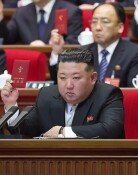Abe to seek the amendment of the Constitution
Abe to seek the amendment of the Constitution
Posted July. 02, 2014 06:47,
Amendment of the Constitution is the next goal after securing collective self-defense right.
This phrase is openly circulating in the Japanese political community these days. It means that now that Japanese Prime Minister Shinzo Abe got Japans collective self-defense right approved by reinterpreting the Pacifist Constitution, he will push to amend the Constitution, the dearest wish of rightists in Japan.
When the Abe administration was inaugurated in December 2012, it adopted the slogan "Lets regain a strong Japan." The Abe administration increased Japans defense budget last year for the first time in 11 years. The administration approved the New Defense Plan that significantly reinforced the functions of its Self-Defense Forces in December last year, and passed the "three principles of defense equipment transfer," which changed the guideline banning its weapons export, in April this year for the first time in 47 years. Then, Tokyo changed interpretation of the Pacifist Constitution on Tuesday, allowing its collective self-defense right. The Japanese administration is moving things at a speed incomparably faster than its predecessor, the government under the Democratic Party of Japan.
Abe has repeatedly announced several times that he will remove the last remaining safety apparatus in the Pacifist Constitution, going beyond its collective self-defense right. In his book, Toward a Beautiful Country: My Vision for Japan," Abe said, The Japanese people should make from scratch with their own hands the skeleton (Constitution) of the country. Only when we do this, will Japan secure genuine independence, in expressing his commitment to amend the Constitution. He thus indicated that he will change constitutional order that Japan as a loser in World War II was unilaterally forced to accept. It means that Japan now seeks to become a country that can stage a war confidently without worrying about a third partys position and interference.
These polices remind people of Nobusuke Kishi (1896-1987), the late former Prime Minister and Abes maternal grandfather. Former Prime Minister Kishi served prison term as a Class A war criminal after World War II. He later was legally reinstated, and inaugurated as Prime Minister in 1957. Before resigning as premier, he changed the U.S.-Japan security treaty in 1960 despite strong public objection.
In his book, Abe openly said, I inherited Nobusuke Kishis DNA. Before dying, Kishi left to future generations two tasks: amendment of the Constitution, and recovery of the Northern territory (Japanese name for four Kuril Islands). Both are agendas that Abe is striving to achieve.
Abe had focused his efforts on amending the Constitution in the early days after inauguration. Notably, he attempted to revise Article 96 of the Constitution that defines constitutional amendment process in order to make the constitutional amendment process simpler. However, he shelved the bid for a while in the face of strong public resistance.







